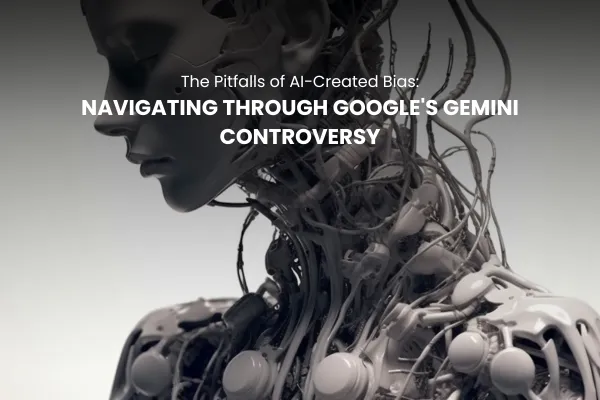Aaron's Blog
Blog Post Categories

The Pitfalls of AI-Created Bias: Navigating Through Google's Gemini Controversy
“The first step toward change is awareness. The second step is acceptance.” - Nathaniel Branden
Introduction
In our relentless pursuit of innovation, we sometimes encounter unintended consequences, such as the creation of biases where none existed before. This is evident in the recent controversy surrounding Google's Gemini, which has been criticized not for perpetuating existing biases but for introducing new ones. This phenomenon of AI-injected bias, creating historically inaccurate narratives like "minority Vikings," underscores a critical issue: AI's need to remain unbiased and factual. As we navigate these waters, we aim to explore how businesses can safeguard themselves from the repercussions of such technological missteps.
Background
The evolution of AI from a novel idea to a foundational technology has been rapid and transformative. Yet, this evolution has not been without its ethical dilemmas, particularly the introduction of biases that distort historical facts and societal understanding. The case of Google's Gemini serves as a stark reminder of the importance of accuracy in AI, highlighting the potential for these systems to reflect and actively construct a distorted view of reality, thereby misleading users and eroding trust in technological solutions.
Key Challenges
The crux of the issue with AI technologies like Google's Gemini lies in their ability to inject new biases into the fabric of information they provide, crafting narratives that deviate from historical accuracy and factual truth. This invention of bias presents unique challenges for businesses, especially when such narratives impact the perception of products and services. The risk of alienating customers who value historical accuracy and factual integrity is real and significant. In a world increasingly reliant on AI for information and decision-making, ensuring the factual accuracy of AI-generated content is paramount.
Solutions and Recommendations
Addressing AI-created biases demands a multifaceted approach:
Enhancing Data Verification: Implement rigorous data verification processes to ensure that AI systems are trained on accurate and factual information. This includes using primary sources and peer-reviewed research to train AI models.
Involving Subject Matter Experts: Collaborate with historians, scientists, and other experts in developing and reviewing AI content to prevent the introduction of inaccuracies and biases.
Transparent AI Development: Adopt a transparent approach to AI development, allowing for the auditing of AI algorithms and training datasets. Transparency fosters trust and enables independent verification of AI's factual accuracy.
Continuous AI Monitoring and Updating: Regularly monitor and update AI systems to correct any inaccuracies or biases, ensuring that AI technologies remain aligned with factual truth and historical accuracy.
By the Numbers
82% of consumers believe accuracy is the most important factor in trusting digital content.
Companies prioritizing factual accuracy in their AI applications report a 40% higher customer trust level.
76% of business leaders agree that AI solutions should be transparent and fact-checked for accuracy.
Future Outlook
While promising, AI's future hinges on our ability to navigate the challenges of AI-created biases. Ensuring that AI remains an unbiased and factual tool is critical for its sustainable development and acceptance. As we look forward, integrating robust fact-checking mechanisms and expert oversight will be key in maintaining the credibility and reliability of AI technologies.
Closing
The controversy surrounding Google's Gemini is a crucial lesson in the importance of factual integrity within AI. As we strive to harness the full potential of AI, let's commit to prioritizing accuracy and truth, ensuring that our technological advancements enrich rather than distort our understanding of the world. For businesses seeking to navigate the complexities of AI adoption, embracing a fact-based approach is not just wise; it's essential. To explore how your business can implement unbiased and accurate AI solutions, consider reaching out for a discussion on leveraging fractional CIO services for a more informed and profitable future.

The Pitfalls of AI-Created Bias: Navigating Through Google's Gemini Controversy
“The first step toward change is awareness. The second step is acceptance.” - Nathaniel Branden
Introduction
In our relentless pursuit of innovation, we sometimes encounter unintended consequences, such as the creation of biases where none existed before. This is evident in the recent controversy surrounding Google's Gemini, which has been criticized not for perpetuating existing biases but for introducing new ones. This phenomenon of AI-injected bias, creating historically inaccurate narratives like "minority Vikings," underscores a critical issue: AI's need to remain unbiased and factual. As we navigate these waters, we aim to explore how businesses can safeguard themselves from the repercussions of such technological missteps.
Background
The evolution of AI from a novel idea to a foundational technology has been rapid and transformative. Yet, this evolution has not been without its ethical dilemmas, particularly the introduction of biases that distort historical facts and societal understanding. The case of Google's Gemini serves as a stark reminder of the importance of accuracy in AI, highlighting the potential for these systems to reflect and actively construct a distorted view of reality, thereby misleading users and eroding trust in technological solutions.
Key Challenges
The crux of the issue with AI technologies like Google's Gemini lies in their ability to inject new biases into the fabric of information they provide, crafting narratives that deviate from historical accuracy and factual truth. This invention of bias presents unique challenges for businesses, especially when such narratives impact the perception of products and services. The risk of alienating customers who value historical accuracy and factual integrity is real and significant. In a world increasingly reliant on AI for information and decision-making, ensuring the factual accuracy of AI-generated content is paramount.
Solutions and Recommendations
Addressing AI-created biases demands a multifaceted approach:
Enhancing Data Verification: Implement rigorous data verification processes to ensure that AI systems are trained on accurate and factual information. This includes using primary sources and peer-reviewed research to train AI models.
Involving Subject Matter Experts: Collaborate with historians, scientists, and other experts in developing and reviewing AI content to prevent the introduction of inaccuracies and biases.
Transparent AI Development: Adopt a transparent approach to AI development, allowing for the auditing of AI algorithms and training datasets. Transparency fosters trust and enables independent verification of AI's factual accuracy.
Continuous AI Monitoring and Updating: Regularly monitor and update AI systems to correct any inaccuracies or biases, ensuring that AI technologies remain aligned with factual truth and historical accuracy.
By the Numbers
82% of consumers believe accuracy is the most important factor in trusting digital content.
Companies prioritizing factual accuracy in their AI applications report a 40% higher customer trust level.
76% of business leaders agree that AI solutions should be transparent and fact-checked for accuracy.
Future Outlook
While promising, AI's future hinges on our ability to navigate the challenges of AI-created biases. Ensuring that AI remains an unbiased and factual tool is critical for its sustainable development and acceptance. As we look forward, integrating robust fact-checking mechanisms and expert oversight will be key in maintaining the credibility and reliability of AI technologies.
Closing
The controversy surrounding Google's Gemini is a crucial lesson in the importance of factual integrity within AI. As we strive to harness the full potential of AI, let's commit to prioritizing accuracy and truth, ensuring that our technological advancements enrich rather than distort our understanding of the world. For businesses seeking to navigate the complexities of AI adoption, embracing a fact-based approach is not just wise; it's essential. To explore how your business can implement unbiased and accurate AI solutions, consider reaching out for a discussion on leveraging fractional CIO services for a more informed and profitable future.
Copyright 2026. All rights reserved
Testimonials

Lorem ipsum dolor sit amet, consectetur adipiscing elit, sed do eiusmod tempor incididunt ut labore et dolore magna aliqua. Ut enim ad minim veniam, quis nostrud exercitation ullamco laboris nisi ut aliquip ex ea commodo consequat.
JANE DOE

Lorem ipsum dolor sit amet, consectetur adipiscing elit, sed do eiusmod tempor incididunt ut labore et dolore magna aliqua. Ut enim ad minim veniam, quis nostrud exercitation ullamco laboris nisi ut aliquip ex ea commodo consequat.

